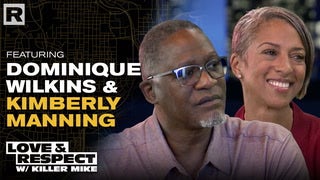

WATCH
S1 E3 | Dominique Wilkins & Dr. Kimberly Manning
00:20:24
This week on “Love and Respect with Killer Mike,” Michael “Killer Mike” Render sat down with two people serving the Atlanta community in different ways — proving that you don’t have to be born in Atlanta to make it your home.
NBA legend Jacques Dominique Wilkins is an Atlanta icon. Despite being born in Paris, and raised in Baltimore and North Carolina, his 1982 arrival in Atlanta was the start of one of the most storied careers in Atlanta Hawks history. Wilkins was a crucial player in an era when the Hawks would register four consecutive 50-win seasons. And during his 11-year career with the Hawks, the former athlete was a nine-time NBA All-Star, the winner of two NBA slam dunk contests, and as of 2021, sits at number 14 on the top NBA scorers list. Since then, Wilkins has been an integral part of the Atlanta Hawks franchise, serving as their vice president of basketball, a mentor, and an ambassador — repeatedly proving that his allegiance is to the city of Atlanta.
With those kinds of credentials, it seems a given that Hall of Famer Wilkins would feature prominently on any list. But when the NBA released their top 50 player list in 1996, he was ostensibly left off. “It just goes to show that politics exist in every form. At the time the list came out [in 1996], I was the top seven NBA scorer in league history,” he said. Wilkins easily shrugs it off now, but even league rivals Larry Bird and Magic Johnson questioned how he was left off the list. Bird, who, along with the Celtics was Wilkins’ greatest rival in the 1980s, said when it came to dunking, “As an acrobat, Dominique is even more interesting in many ways than Michael Jordan.”
Thankfully, the NBA’s recent 75th-anniversary list of 75 greatest players rectified this wrong, including Wilkins on the list. For the star, his time with the Hawks, and in the NBA overall — and not some list — is the ultimate testament to his prowess as a player. Post-NBA, Wilkins continues to play in charity games, guide the Hawks on issues with the Atlanta community, and serve his adopted community.
This is the same adopted community as Emory University’s Dr. Kimberly Manning. She is a general internist/hospitalist who serves as associate vice chair of diversity, equity, and inclusion for the department of medicine at Emory University School of Medicine. A multi-award-winning professor and medical professional, Dr. Manning is a woman who wears many hats, and one is that of a community educator.
Over the past few months, she has been stationed at Atlanta’s Grady Hospital, sharing information about the COVID-19 vaccines. For Dr. Manning, the fears around these vaccines are very real for the Black community. “We spend so much time talking about how the science is real, but the history is real, too,” she said. The medical professional is intimately familiar with that history. She’s a third-generation Tuskegee University graduate (Fun fact: Her parents and grandparents met on the campus grounds).
It was with this knowledge that Dr. Manning enrolled in the COVID-19 vaccine trials. “I wanted to sit down as someone who looks like me, and be able to sit down with the consent our ancestors were denied,” she stated. The doctor also wants to ensure that people keep the memory of injustices like the Tuskegee experiment alive, but not to conflate that with the rigors of testing and research that went into the COVID-19 vaccination. She added: “There were Black people [in the vaccine trials] that were properly investigated…in Tuskegee, individuals were denied treatment for Syphilis, which is different from what we’re doing here.”
Ultimately, Dr. Manning doesn’t dedicate her time trying to persuade people to get vaccinated, but rather to share factual information. “I am not looking for you to be vaccinated, but to give some information to you, to make the best decision for your family,” she said. This is how she serves her adopted community by keeping people informed and helping them make the best decision for their health. The professional added, “There is nothing more powerful than Black people loving on Black people.”
Watch episode three above!